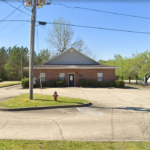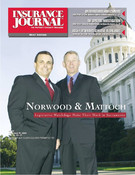The nearest way to come at glory is to do for conscience what you would do for glory,” said Gordon Stewart, president of the Insurance Information Institute (III), at the Insurance Industry Charitable Foundation’s 2004 Bridge Week Luncheon Celebration held on Oct. 21.
Stewart used this quote from Benjamin Franklin to define the ideal relationship between the public and the insurance industry during his keynote presentation titled “Us and Them–Who is Who and What’s the Difference?”
Stewart lauded the industry’s achievements during IICF Bridge Week, held Oct. 9-17, when teams of insurance industry volunteers provided three or more hours of service to non-profit organizations in their neighborhoods. Stewart discussed the importance of creating unity within the competitive insurance industry and showing the public that the industry puts conscience before glory.
He said that it is sometimes difficult to find a center to the insurance industry. “There are very few things that the insurance industry does together,” Stewart said. “It’s difficult for insurance to establish a common identity in people’s minds.” He said that IICF Bridge Week helps establish that common identity, but developing an amicable relationship between the industry and the public will take more than volunteer efforts and charitable contributions.
“The principal value is not the image of the industry,” he said. “It’s not likely that image will overcome what people actually feel about their car or home insurance.”
Stewart said that the intimate relationship and experiences that the public has with the industry day to day will carry more weight than any insurance image-building.
According to III, public approval of the insurance industry is currently between 55 and 60 percent and has hovered there over the past five years. Stewart said that perception of the industry has come a long way since the mid- to late-eighties, when approval was down around 33 percent.
“Our industry was in pretty bad shape with the body politic,” he said. “We were at a pretty low point.”
It was at that point that Proposition 103 was passed, a direct result of the public’s frustration with the insurance industry, he said.
“Propositions are only successful when there’s widespread discontent and dissatisfaction with the relationship between the public and the industry,” he said. “The public said, ‘We don’t really know your business or how it all really works and how the pricing works, but we’re going to give you 20 percent less money and you figure out how to use it.'”
Stewart discussed several catastrophes that happened in the nineties, including the Oakland fires, Hurricane Andrew and the Northridge Quake. He also talked about the more recent Southern California wildfires and the four hurricanes that have devastated Florida this year. He emphasized the importance of helping people who are affected by disasters, thus continuing a historical legacy focused on serving the American people where they live.
“What is different about the United States from the rest of the world? This country was settled by us,” he said. “When you start to clear land and build houses, you need to provide some sort of risk transfer. There is a need for people to share the risk of settling a new place. Our insurance business, property/casualty, grew up with the country, which is largely why insurance is decentralized. The centers are where it grew up because that’s where it served the people that settled that place.”
Stewart was asked what he thought would happen to companies affected by the recent probe into contingent commission agreements by New York Attorney General Eliot Spitzer.
“Our reputation will depend on what we’ve already put in the bank,” Stewart responded. “If we are on [the public’s] side, doing for them what the people who built the industry were doing, then we will come out of this ok.”
Another speaker at the IICF Bridge Week Luncheon was Wendy Fox, who founded West Covina-based Stepping Stones for Women, one of the non-profit organizations that benefited from IICF Bridge Week. The program helps homeless women with infant children gain physical, emotional and financial success through an intensive two-year plan.
“It is amazing to know that there is an organization, an industry out there that wants to support non-profits in all sorts of ways,” Fox said. “What a pleasure to know that there are people in the insurance industry who want to make a difference in the world of non-profits in many ways, both financial and with your hands and with your feet.”
IICF Chairman Dennis Doyle, senior vice president of American Re-Insurance, encouraged audience members to become involved in Bridge Week.
“All we’re asking is for just a little bit of your time, a little bit of your talents, and a little bit of your treasure,” he said. For more information on volunteering with the oganization, please visit IICF’s Web site at www.iicf.org.
Topics Market
Was this article valuable?
Here are more articles you may enjoy.


 Former Ole Miss Standout Player Convicted in $194M Medicare, CHAMPVA Fraud
Former Ole Miss Standout Player Convicted in $194M Medicare, CHAMPVA Fraud  Allstate Doubles Q4 Net Income While Auto Underwriting Income Triples
Allstate Doubles Q4 Net Income While Auto Underwriting Income Triples  Longtime Alabama Dentist Charged With Insurance Fraud in 2025 Office Explosion
Longtime Alabama Dentist Charged With Insurance Fraud in 2025 Office Explosion  The $3 Trillion AI Data Center Build-Out Becomes All-Consuming for Debt Markets
The $3 Trillion AI Data Center Build-Out Becomes All-Consuming for Debt Markets 


